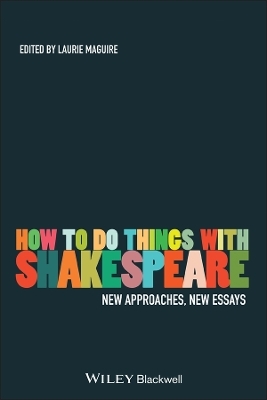
How To Do Things With Shakespeare
Wiley-Blackwell (Verlag)
978-1-4051-3527-6 (ISBN)
HOW TO DO THINGS WITH SHAKESPEARE HOW TO DO THINGS WITH SHAKESPEARE
“This is a companion to Shakespeare with a difference. Vive la différance!”
DAVID BEVINGTON, UNIVERSITY OF CHICAGO
“Doing things with literature: scholarly articles are not the only way to go. Aristotle uses a lecture, Horace a letter, Sidney a mock oration. Laurie Maguire and the contributors to this book engage in a genial conversation that invites students in. Like all good conversations, this one admits first-person candor, keeps things lively by changing the subject five times, welcomes disagreements, and waits for what the reader-listener is going to do in response.”
BRUCE SMITH, UNIVERSITY OF SOUTHERN CALIFORNIA, LOS ANGELES
Laurie Maguire is a Fellow of Magdalen College and Reader in English at Oxford University. Her books include Shakespearean Suspect Texts (1996), Studying Shakespeare (2004), Where There's a Will There's a Way (2006), and Shakespeare's Names (2007). Maguire has published widely on Renaissance drama, textual problems, performance, and women's studies.
Notes on Contributors. Introduction: Laurie E. Maguire (Magdalen College, University of Oxford).
Part I How To Do Things with Sources.
1. French Connections: The Je-Ne-Sais-Quoi in Montaigne and Shakespeare: Richard Scholar (Oriel College, Oxford).
2. Romancing the Greeks: Cymbeline’s Genres and Models: Tanya Pollard (Brooklyn College, City University of New York).
3. How the Renaissance (Mis)Used Sources: The Art of Misquotation: Julie Maxwell (Lucy Cavendish College, Cambridge).
Part II How To Do Things with History.
4. Henry VIII, or All is True: Shakespeare’s “Favorite” Play: Chris R. Kyle (Syracuse University).
5. Catholicism and Conversion in Love’s Labour’s Lost: Gillian Woods (Wadham College, Oxford).
Part III How To Do Things with Texts.
6. Watching as Reading: The Audience and Written Text in Shakespeare’s Playhouse: Tiffany Stern (University College, Oxford).
7. What Do Editors Do and Why Does It Matter?: Anthony B. Dawson (University of British Columbia).
Part IV How To Do Things with Animals.
8. “The dog is himself”: Humans, Animals, and Self-Control in The Two Gentlemen of Verona: Erica Fudge.
(Middlesex University).
9. Sheepishness in The Winter’s Tale: Paul Yachnin (McGill University).
Part V How To Do Things with Posterity.
10. Time and the Nature of Sequence in Shakespeare’s Sonnets: “In sequent toil all forwards do contend”: Georgia Brown (independent scholar).
11. Canons and Cultures: Is Shakespeare Universal? : A. E. B. Coldiron (Florida State University).
12. “Freezing the Snowman”: (How) Can We Do Performance Criticism?: Emma Smith (Hertford College, Oxford).
Index
| Erscheint lt. Verlag | 17.9.2007 |
|---|---|
| Verlagsort | Hoboken |
| Sprache | englisch |
| Maße | 155 x 231 mm |
| Gewicht | 472 g |
| Themenwelt | Geisteswissenschaften ► Sprach- / Literaturwissenschaft ► Anglistik / Amerikanistik |
| Geisteswissenschaften ► Sprach- / Literaturwissenschaft ► Literaturgeschichte | |
| Geisteswissenschaften ► Sprach- / Literaturwissenschaft ► Literaturwissenschaft | |
| ISBN-10 | 1-4051-3527-1 / 1405135271 |
| ISBN-13 | 978-1-4051-3527-6 / 9781405135276 |
| Zustand | Neuware |
| Haben Sie eine Frage zum Produkt? |
aus dem Bereich


